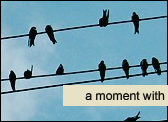NY TIMES MOVIE REVIEW ON SHADOWS

Culture.
Milcho Manchevski’s quasi-religious ghost story, “Shadows,” is an unwieldy hybrid of historical allegory and supernatural mystery. The historical part deals with suppressed memories of the little-known persecution of Aegean Macedonians in the early 20th century. In this Balkan fusion of “Hamlet” and “Macbeth,” the spirits of persecuted victims return to haunt the living and demand a proper burial.
The mystery is a supernatural romance and detective yarn indebted to “The Sixth Sense,” “The Others” and “Ghost,” embellished with abundant nudity and heavy-breathing sex. If the movies weren’t already inundated with stories of the undead, this fusion of genres might not seem so unintentionally silly. But the history is too sketchy to resonate. We hear of atrocities that were committed, but not who committed them, why or when.
In his director’s statement, Mr. Manchevski, who won international acclaim with his 1994 film, “Before the Rain,” declares that “Shadows” imagines “what would happen if Lady Macbeth had lived today and survived to have a grown-up son, who might try to come to terms with her overbearing presence and her transgressions of the past.”
But Vera Perkova (Sabina Ajrula-Tozija), a famous doctor and the imperious stand-in for Shakespeare’s dragon lady, is only a minor character. And her crimes, when revealed, are not as horrifying as you are led to expect.
“Shadows” begins with a car crash in which Vera’s son, Lazar Perkov (Borce Nacev), a young Macedonian doctor who works in the same hospital as his mother, nearly dies. Lazar (note the deliberate echo of Lazarus) is nicknamed Lucky, not only for his narrow escape but also for his privileged existence. His wealthy parents have a villa in Macedonia’s lake region; he is handsome (Mr. Nacev resembles the young Al Pacino), with a beautiful wife and a young son.
A year after the accident, while his wife and son are on vacation, Lazar comes home from work to discover a wizened crone (Ratka Radmanovic) cleaning his kitchen floor. Speaking in a dialect he cannot understand, she reaches up to touch his face; he panics and ejects her from the house. Gazing anxiously out the window, he sees her on the street, intently peering up at his apartment, a wolf by her side.
The old woman is the first of several otherworldly manifestations who begin stalking Lazar, materializing suddenly, then disappearing, only to return. Another persistent stalker is a scowling, craggy-faced neighbor (Salaetin Bilal) who carries a little boy in his arms and leaves bloody tracks as he wearily trudges up the stairs.
The most mysterious is Menka (Vesna Stanojevska), a seductive young woman with severe bruises on her neck and arms, who shamelessly throws herself at Lazar when he examines her injuries. He resists her, but not for long. Menka, who falsely claims to be the wife of a noted linguist whom Lazar consults while seeking to translate the old woman’s words, explains what they mean: “Return what’s not yours — have respect.” But he has no idea how that dictum might apply to him, since he has no recollection of having stolen anything.
As “Shadows” vacillates between the historical and the occult, you may snicker at the way hackneyed horror movie conventions are redeployed for more serious ends. But you won’t be bored. The movie is well acted (especially by Ms. Stanojevska) and very sexy. Fabio Cianchetti’s opulent cinematography skillfully uses reflections in mirrors and windowpanes to give “Shadows” a surreal dimension.
The story doesn’t culminate in the kind of “gotcha” revelation that ended “The Sixth Sense” and “The Others.” Instead it offers a sentimental dilution of the Orpheus-Eurydice myth. History is forgotten as “Shadows” is overrun by the ghosts of “Ghost,” “Heaven Can Wait” and a hundred other movies in which passion beckons from beyond the grave.
[Culture.in.mk]


























Post a Comment